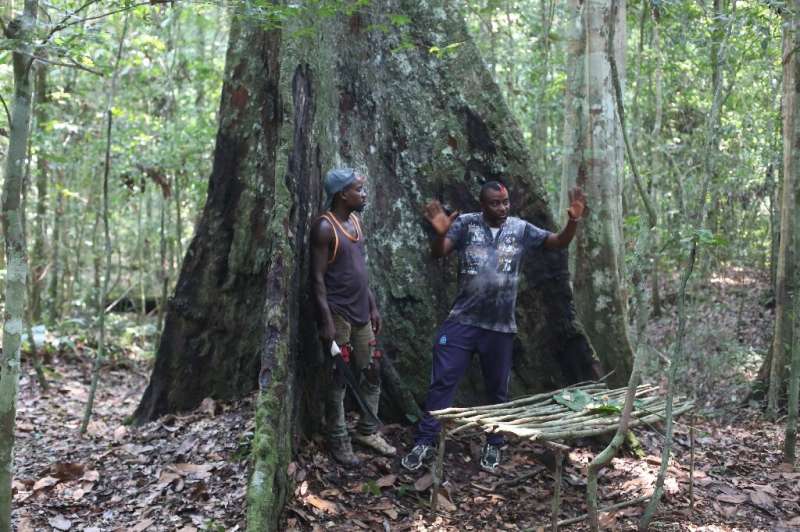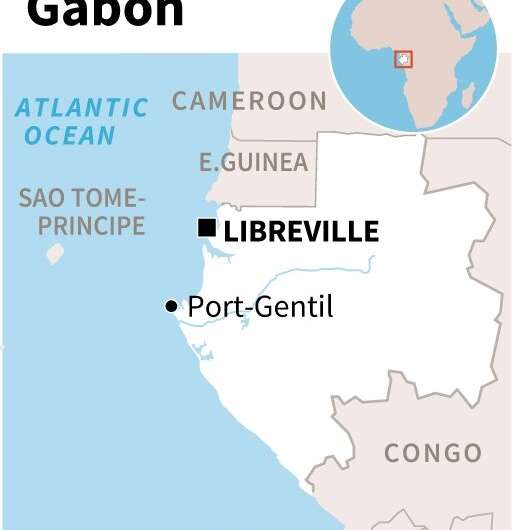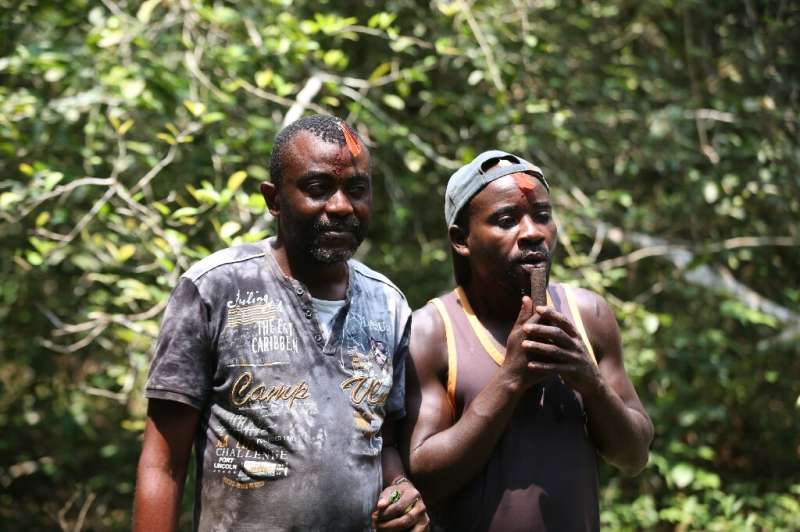Gabonese village fights to save forest from logging

Under the green canopy of the ancient Massaha forest in northeastern Gabon, Arsene Ibaho leads a group of visitors towards a tree that he says is sacred and speaks to his people.
Red clay is daubed on everyone’s foreheads enabling them “to connect to the ancestors, and warn them of our coming,” says Ibaho.
With that accomplished, the 43-year-old conducts a ritual at the foot of the precious kevazingo tree, reciting words in the local language, Kota.
Ibaho is one of around 200 inhabitants in Massaha, a village in the vast province of Ogooue-Ivindo more than 600 kilometres (375 miles) from the capital Libreville.
The sacred tree is also embedded in folklore as the bringer of good luck for fishermen during the mid-year dry season, said Ibaho.
Rituals at the tree enabled fishers to fill a 15-metre (50-feet) -long boat with a bounty of fish, “and all the village could tuck in,” Arsene said.
Beatrice Itsetsame, 69, recounted her trips into the forest, where she collected nkumu, a small edible vine, and also bushmeat for ceremonies.
“The forest is rich, it supports us”, she said, wrapped in a blue boubou robe with a yellow motif.
Debate
Massaha, lying on the Libumba, a tributary of the Ivindo River, finds itself at the heart of a passionate debate about the future of logging and conservation in Gabon.

The central African state is hosting a two-day summit starting Wednesday on how to protect tropical forests—a treasure chest of biodiversity and buffer against carbon emissions.
Loggers were given authorisation to exploit trees in the Massaha area covering 11,300 hectares (28,000 acres)—a territory nearly the size of Paris.
Ibaho said the loggers set up a lumber yard in a forest clearing where there once had been a village.
Their bulldozers gouged a swathe through the area, making it impossible to identify the location of three graves, he said, wielding a machete to clear undergrowth.
“They had no idea where the old villages were—now our history has been cut in half,” said Serge Ekazama-Koto, a community spokesperson.
Protected status?
Angry and fearful, the local community three years ago asked the government to scrap the logging licence on the grounds of suspected violations and a threat to “biocultural heritage.”
In March 2022, their activism garnered a visit from Lee White, the minister of water, forests and the environment.
White, a British-born conservationist, subsequently stopped the logging, ordered the company to withdraw its machines and floated the theory of creating a new status of protected area.
The idea is being discussed as part of an overhaul of the logging code.

White, in an interview with AFP, acknowledged there had been problems.
“The fact that bulldozers came to a sacred forest close to a village means that we failed at every stage,” he said.
That’s why, he said, “we are currently asking—do we need a stronger status?”
Local people say they have been heartened by recent progress since White’s visit. Last month, a government team went to the area to geolocate the coordinates of sacred sites—a key step in the process of protection.
The authorities, representatives of the community and NGOs are looking at the status options.
They include a model inspired by West African countries that aims to protect traditional sites, permits sustainable harvesting of resources and facilitates participation by local people.
Communities “want to be at the heart of governing the area” yet current protection status reflects “a model of state management,” said Alex Ebang Mbele, head of an NGO called Nsombou Abalge-Dzal Association (NADA), which is calling for new conservation laws.
“Often, it’s the state that imposes the creation of protected areas,” said Lucien Massoukou, director general of wildlife and protected areas at the forest and environment ministry.
But “when a community has the will to preserve its space, it starts to take on ownership of the concept of conservation,” he said.
Ibaho said local people had already chosen a name for the site in the Kota language—Ibola Dja Bana Ba Massaha, meaning “the reserve for all the children of Massaha.”
© 2023 AFP
Citation:
Gabonese village fights to save forest from logging (2023, March 1)
retrieved 1 March 2023
from https://phys.org/news/2023-03-gabonese-village-forest.html
This document is subject to copyright. Apart from any fair dealing for the purpose of private study or research, no
part may be reproduced without the written permission. The content is provided for information purposes only.
For all the latest Science News Click Here
For the latest news and updates, follow us on Google News.

